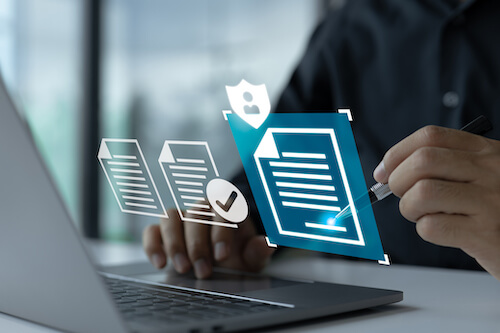Importance of Email Archiving for eDiscovery and Legal Holds
Discover the importance of email archiving for eDiscovery and legal holds, including compliance, security measures, and choosing the right solution.
We all know that email archiving can help large organizations like yours when it comes to compliance, eDiscovery, ...
We all know that email archiving can help large organizations like yours when it comes to compliance, eDiscovery, litigation and also internal reviews. Large organizations generate and consume a huge amount of email data every day. Email Archiving GDPR compliance is something that you, and your organization should be concerned about.
It's a lot of data to manage. Email retention needs careful thought and planning in order to ensure compliance.
In this blog we'll discuss compliance with GDPR and how archiving data can help. If you're a decision maker in your organization you need to fully understand this information and how email archiving GDPR regulations apply to your data.

Let's dive into the world of data protection regulations, focusing on email archiving GDPR and CCPA.
The General Data Protection Regulation (GDPR) of the European Union and the California Consumer Privacy Act (CCPA) have made quite a splash, introducing new requirements for businesses to protect personal data.
What are the key distinctions between GDPR and CCPA?
Here are GDPR's six lawful bases for processing personal data:
In short, you need a valid reason to process an individual's personal data under GDPR rules. This includes email data sent and received in your organization.
Understanding both GDPR and CCPA is crucial in today's digital landscape. It's important for businesses to protect personal data and comply with these regulations. Failure to comply with GDPR can result in GDPR non-compliance fines and penalties.
Email archiving solutions, are your secret weapons to achieving compliance with GDPR and CCPA.
But how?
Idea #1: These tools securely store and centralize email data (typically all emails sent and received in/through the organization) that can be searched when needed, making it easier to manage data.
Idea #2: They're a cost effective way to provide the base data for any kind of litigation or investigation.
Sounds good so far?
Let's consider scalability, a key factor for any business that needs to expand its operations without straining its budget.
A cloud-based archival system is a must-have for organizations of all sizes as it grows with your business needs without breaking the bank.
This way, you'll ensure regulatory compliance while keeping up with ever-evolving privacy laws.
Email encryption is another crucial aspect of GDPR, ensuring that personal data remains secure during transmission.
But what are the different methods?
To ensure your organization's emails remain compliant with GDPR requirements, follow these best practices:
Let's talk about another aspect of GDPR - data erasure. Article 17 of the GDPR outlines "the right to be forgotten," which requires businesses to periodically review their retention policies for adherence. This is where implementing effective data erasure procedures comes into play. End-users who delete emails containing personal data, is not enough, especially if your company has implemented email journaling (as there will be a copy of every message sent and received, in that archive)
- It's important to identify all personal data stored across your organization, including emails, documents, and databases.
- Establish clear guidelines on when and how specific types of information should be deleted or anonymized in accordance with regulations.
- Automate deletion processes using email archiving solutions that support policy-based retention rules and secure disposal methods.
- Create an audit trail by documenting every step taken.
Remember, proper data erasure procedures and periodic reviews on retention policy adherence are essential in maintaining compliance.
At Cloudficient, we understand the importance of email archiving and data retention. Don't risk GDPR non-compliance - let us help you with your email archiving and data retention requirements.

To ensure compliance with GDPR and CCPA, it's important to establish email retention policies that align with these regulations.
But how do you create such policies?
Step #1: Identify the types of data your organization processes and determine appropriate retention periods for each category.
Step #2: Establish clear guidelines on when to delete or archive emails containing personal information.
Step #3:Create a policy document outlining all relevant details, including legal bases for processing data under GDPR and CCPA requirements.
Beyond creating these policies, employee training is essential too.
Your employees play a significant role in maintaining regulatory compliance within your organization.
With well-crafted company-wide policies and proper employee training, you'll be on your way to achieving GDPR and CCPA compliance in no time.
To achieve compliance, it's important to assess your organization's current data management practices. Here are some actionable steps:
Step #1: Evaluate how long your organization needs to retain specific types of information in accordance with the regulations. Consider geographic regulations as well as industry based ones.
Step #2: Identify any gaps or weaknesses in your existing processes that may hinder compliance efforts.
Step #3: Implement necessary changes and improvements to ensure full adherence to GDPR requirements.
Step #4: Periodic review of regulations, and policies to ensure they align.
One area that requires attention is email archiving. Personal data is often stored in email data, and GDPR applies to the retention and deletion of emails. GDPR states that personal data must be processed in a manner that ensures its security, including protection against unauthorized or unlawful processing and against accidental loss, destruction or damage.
GDPR non-compliance can result in hefty fines, so it's important to have retention policies in place that align with data protection laws.
Here are some additional steps:
And there you have it - a solid foundation upon which you can build a compliant data management strategy.
In conclusion, it is crucial for large organizations to understand email archiving GDPR and CCPA requirements to comply with regulations. Email archiving solutions provide scalability, security, data protection and more. Email encryption ensures secure communication.
Effective data erasure procedures must be implemented, along with periodic reviews on retention policy adherence. Developing company-wide policies aligned with regulations and training employees on proper data handling procedures are essential steps towards compliance.
Discover the importance of email archiving for eDiscovery and legal holds, including compliance, security measures, and choosing the right solution.
Ensure email compliance by managing and storing emails according to legal requirements. Learn about email compliance regulations with Cloudficient’s...
Discover the top email archiving solutions for large organizations, ensuring compliance, efficient data management, and seamless legal discovery...